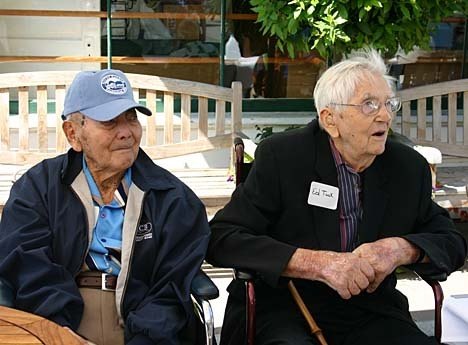Ed Tuck, who was assistant foreman of Roche Harbor Lime & Cement Co. in the 1930s and 1940s, has died.
Mr. Tuck, who lived in Tacoma, died Aug. 17, his daughter, Cookie Tuck-Lowe, wrote in an e-mail received Saturday.
“Dad sailed away Monday to join Mother,” Tuck-Lowe wrote.
A Celebration of Life will be held on the island at a later date.
Mr. Tuck last visited Roche Harbor on July 18 for a luncheon and book signing celebrating the new book, “Roche Harbor” (Arcadia Publishing Co.). He is prominently featured in the book: He married a Roche Harbor girl, Angela “Peggy” Kreger, whose father worked for the lime company. Two of the Tucks’ five children were born in Roche Harbor. Mr. Tuck crushed rock, fired the kilns, worked in the power plant, and rose to the position of assistant foreman. He was also involved in the unionization of Roche Harbor’s workforce.
Among the people with whom he visited and shared memories at the July 18 luncheon: Wolf Bauer, who was chief engineer from 1936-39 and, during a strike, joined other managers in the quarries to keep the company going until the strike ended.
A Journal columnist was very conscious of the historical significance of Mr. Tuck’s return to Roche Harbor, as well as the visit of members of other early families for the luncheon and book signing.
“Their heads were grayer, their steps more careful, these men who once made history here in this seaside village,” he wrote.
“Some of them cut wood, fired kilns and bagged lime here years ago; they were the reason Roche Harbor was the largest limeworks west of the Mississippi. Some of them worked here in 1956, when the village began its conversion into a premier Northwest boating destination.
“But this place was more than a lime company town or a boating resort town to them. Some of them fell in love, married, and raised their children here, where, an early writer wrote, ‘A rock-bound coast hems in a wealth of verdant pastures sweet / Deep forests cover vale and hill where fresh and salt waters meet.’
“And no matter their age or how long they’d been away, each came back and found the Roche Harbor they knew and remembered experiences that continue to be shared by subsequent generations.”
An obituary for Mr. Tuck will be posted when received; you can read the column about Mr. Tuck’s last visit to Roche Harbor HERE



